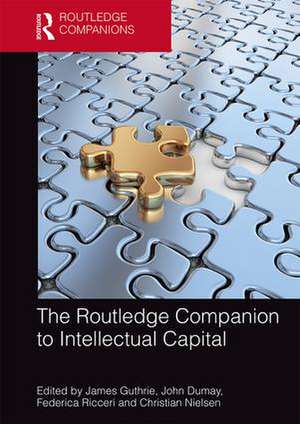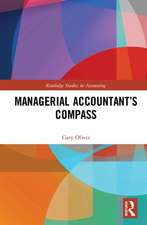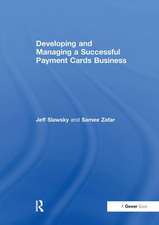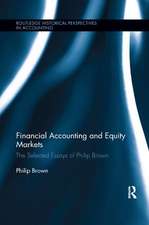The Routledge Companion to Intellectual Capital: Routledge Companions in Business, Management and Marketing
Editat de James Guthrie, John Dumay, Federica Ricceri, Christian Nielsenen Limba Engleză Hardback – 9 oct 2017
Combining theoretical and practice perspectives, this comprehensive Companion addresses the role of IC inside and between organisations and institutions and how these contribute to the IC of nations, regions and clusters.
Drawing on an extensive range of leading contributors,The Routledge Companion to Intellectual Capital will be of interest to scholars who want to understand IC from a variety of perspectives, as well as students who are seeking an authoritative and comprehensive source on IC and knowledge management.
| Toate formatele și edițiile | Preț | Express |
|---|---|---|
| Paperback (1) | 435.27 lei 43-57 zile | |
| Taylor & Francis – 30 iun 2021 | 435.27 lei 43-57 zile | |
| Hardback (1) | 1220.57 lei 43-57 zile | |
| Taylor & Francis – 9 oct 2017 | 1220.57 lei 43-57 zile |
Din seria Routledge Companions in Business, Management and Marketing
-
 Preț: 347.69 lei
Preț: 347.69 lei - 9%
 Preț: 1483.57 lei
Preț: 1483.57 lei -
 Preț: 372.15 lei
Preț: 372.15 lei -
 Preț: 349.09 lei
Preț: 349.09 lei -
 Preț: 444.18 lei
Preț: 444.18 lei -
 Preț: 344.76 lei
Preț: 344.76 lei -
 Preț: 347.81 lei
Preț: 347.81 lei -
 Preț: 386.77 lei
Preț: 386.77 lei -
 Preț: 328.31 lei
Preț: 328.31 lei -
 Preț: 333.95 lei
Preț: 333.95 lei -
 Preț: 345.05 lei
Preț: 345.05 lei -
 Preț: 344.16 lei
Preț: 344.16 lei -
 Preț: 387.24 lei
Preț: 387.24 lei - 25%
 Preț: 1250.43 lei
Preț: 1250.43 lei - 27%
 Preț: 1213.99 lei
Preț: 1213.99 lei - 25%
 Preț: 1220.82 lei
Preț: 1220.82 lei - 25%
 Preț: 1250.99 lei
Preț: 1250.99 lei - 25%
 Preț: 1305.32 lei
Preț: 1305.32 lei - 25%
 Preț: 1248.01 lei
Preț: 1248.01 lei - 25%
 Preț: 1220.57 lei
Preț: 1220.57 lei - 27%
 Preț: 1217.34 lei
Preț: 1217.34 lei - 27%
 Preț: 1218.96 lei
Preț: 1218.96 lei - 27%
 Preț: 1224.75 lei
Preț: 1224.75 lei - 26%
 Preț: 1217.73 lei
Preț: 1217.73 lei - 29%
 Preț: 1356.90 lei
Preț: 1356.90 lei - 28%
 Preț: 1365.47 lei
Preț: 1365.47 lei - 31%
 Preț: 1205.39 lei
Preț: 1205.39 lei - 25%
 Preț: 1223.00 lei
Preț: 1223.00 lei - 18%
 Preț: 1810.89 lei
Preț: 1810.89 lei - 26%
 Preț: 1241.05 lei
Preț: 1241.05 lei - 26%
 Preț: 1241.05 lei
Preț: 1241.05 lei - 25%
 Preț: 1191.87 lei
Preț: 1191.87 lei - 26%
 Preț: 1356.90 lei
Preț: 1356.90 lei - 25%
 Preț: 1367.35 lei
Preț: 1367.35 lei - 34%
 Preț: 1245.24 lei
Preț: 1245.24 lei - 25%
 Preț: 1251.25 lei
Preț: 1251.25 lei - 18%
 Preț: 1804.73 lei
Preț: 1804.73 lei - 25%
 Preț: 1220.17 lei
Preț: 1220.17 lei - 25%
 Preț: 1220.57 lei
Preț: 1220.57 lei - 26%
 Preț: 1215.38 lei
Preț: 1215.38 lei - 18%
 Preț: 1620.92 lei
Preț: 1620.92 lei - 34%
 Preț: 1193.29 lei
Preț: 1193.29 lei - 25%
 Preț: 1223.84 lei
Preț: 1223.84 lei - 25%
 Preț: 1221.40 lei
Preț: 1221.40 lei - 26%
 Preț: 1356.48 lei
Preț: 1356.48 lei - 25%
 Preț: 1249.73 lei
Preț: 1249.73 lei
Preț: 1220.57 lei
Preț vechi: 1674.42 lei
-27% Nou
Puncte Express: 1831
Preț estimativ în valută:
233.55€ • 244.50$ • 193.25£
233.55€ • 244.50$ • 193.25£
Carte tipărită la comandă
Livrare economică 07-21 aprilie
Preluare comenzi: 021 569.72.76
Specificații
ISBN-13: 9781138228214
ISBN-10: 1138228214
Pagini: 532
Ilustrații: 53 Line drawings, black and white; 52 Tables, black and white; 53 Illustrations, black and white
Dimensiuni: 174 x 246 x 37 mm
Greutate: 1.07 kg
Ediția:1
Editura: Taylor & Francis
Colecția Routledge
Seria Routledge Companions in Business, Management and Marketing
Locul publicării:Oxford, United Kingdom
ISBN-10: 1138228214
Pagini: 532
Ilustrații: 53 Line drawings, black and white; 52 Tables, black and white; 53 Illustrations, black and white
Dimensiuni: 174 x 246 x 37 mm
Greutate: 1.07 kg
Ediția:1
Editura: Taylor & Francis
Colecția Routledge
Seria Routledge Companions in Business, Management and Marketing
Locul publicării:Oxford, United Kingdom
Public țintă
PostgraduateCuprins
Table of Contents
- The past, present and future for intellectual capital research: An overviewJohn Dumay, James Guthrie, Federica Ricceri, and Christian Nielsen
Part 1 – Stage 5: Critical IC - The critical path of intellectual capitalJohn Dumay, James Guthrie, and Jim Rooney
- Accounting for peopleRobin Roslender and Lissa Monk
Part 2 – Stage 4: IC Ecosystems - Seven Dimensions to Address for Intellectual Capital and Intangible Assets NavigationLeif Edvinsson
- Understanding and exploiting intellectual capital grounding regional development: Framework and metricsGiovanni Schiuma and Antonio Lerro
- Past, present, and future: Intellectual capital and the New Zealand public sectorGrant Samkin and Annika Schneider
- Intellectual capital in the context of healthcare organizations: Does it matter?Emidia Vagnoni
Part 3 – Stage 3: IC in Practice - Rethinking models of banks and financial institutions using empirical research and ideas about intellectual capitalJohn Holland
- Mobilizing intellectual capital in practice – A story of an Australian financial institutionVijaya Murthy and James Guthrie
- Intellectual capital management in public universitiesJan Michalak, Joanna Krasodomska, Gunnar Rimmel, Jesper Sort, and Dariusz Trzmielak
- IC – A (re)turn to practiceHannu Ritvanen and Karl-Erik Sveiby
- Intellectual capital and innovationJim Rooney and John Dumay
- Intellectual capital disclosure in digital communicationMaurizio Massaro and John Dumay
- Enabling relational capital through customer performance measurement practices: A study of not-for-profit organizationsSuresh Cuganesan
- Sustained competitive advantage and strategic intellectual capital management – Evidence from Japanese high performance small to medium sized enterprisesJun Yao and Chitoshi Koga
- Towards an integrated intellectual capital management frameworkUlf Johanson
- Enabling intellectual capital measurement through business model mapping: The Nexus caseMarco Montemari and Maria Serena Chiucchi
- Intellectual capital disclosure: What benefits, what costs, is it voluntary?Sarah Jane Smith
- Wissensbilanz Made in Germany – 12 years of experience confirm a powerful instrumentManfred Bornemann
- A management control system for environmental and social initiatives: An intellectual capital approachPaola Demartini and Cristiana Bernardi
- Levers and barriers to the implementation of intellectual capital reports: A field studyMaria Serena Chiucchi, Marco Giuliani, and Stefano Marasca
- Revival of the fittest? Intellectual capital in Swedish companiesGunnar Rimmel, Diogenis Baboukardos, and Kristina Jonäll
- Emerging integrated reporting practices in the United StatesMary Adams
- Capital reporting in Sweden: Insights about inclusiveness and integrativenessPeter Beusch and Axel Nilsson
Part 4 – Stage 2: IC Guidelines - Key contributions to the intellectual capital field of studyGöran Roos
- Value creation in business models is based in intellectual Capital – And only intellectual capital!Henrik Dane-Nielsen and Christian Nielsen
- Making intellectual capital matter to the investment communityMorten Lund and Christian Nielsen
- Intellectual Capital Profiles and Financial Performance of the FirmHenri Inkinen, Paavo Ritala, Mika Vanhala, and Aino Kianto
- Does intellectual capital matter for organizational performance in emerging markets? Evidence from Chinese and Russian contextsAino Kianto, Tatiana Garanina, and Tatiana Andreeva
Part 5 – Stage 1: IC Importance - Integrated reporting and the connections between integrated reporting and intellectual capitalCharl de Villiers and Pei-Chi Kelly Hsiao
- The Relevance of IC Indicators
Recenzii
Extended reporting frameworks that encompass intellectual capital have been demonstrated to return the investment made in them many times over. They also evince corporate social, environmental and good corporate governance. An efficient response by companies seeking an optimal market result would be to increase the disclosure and transparency of intellectual capital. Readers of this book will better understand this and discover how to add value in a way that benefits all stakeholders.
Professor Richard Petty, Professor and Executive Director International, Macquarie Graduate School of Management; Macquarie University, Australia.
Routledge Companions are marvellous assemblies of scholarship in specialised fields. I welcome intellectual capital now featuring in this series. Intellectual capital is highly interdisciplinary. This book contains a smörgåsbord of coverage, addressing cross-cutting intellectual capital issues by topic (Business model mapping, customer performance measurement, digital communication, disclosure, firm performance, integrated reporting, investors, value creation), by geography (Australia, China, Japan, New Zealand, Russia, Sweden, US) and by sector (banking, healthcare, universities). Some of the earliest writers feature as authors (who the editors call "grandfathers" of intellectual capital), as do some of the most prolific intellectual capital scholars, together with some active intellectual capital practitioners. The thirty chapters represent a mix of theory and practice, including case studies. This text will quickly become one of the leading resources for intellectual capital researchers.
Niamh Brennan, Michael MacCormac Professor of Management, University College Dublin, Ireland.
Professor Richard Petty, Professor and Executive Director International, Macquarie Graduate School of Management; Macquarie University, Australia.
Routledge Companions are marvellous assemblies of scholarship in specialised fields. I welcome intellectual capital now featuring in this series. Intellectual capital is highly interdisciplinary. This book contains a smörgåsbord of coverage, addressing cross-cutting intellectual capital issues by topic (Business model mapping, customer performance measurement, digital communication, disclosure, firm performance, integrated reporting, investors, value creation), by geography (Australia, China, Japan, New Zealand, Russia, Sweden, US) and by sector (banking, healthcare, universities). Some of the earliest writers feature as authors (who the editors call "grandfathers" of intellectual capital), as do some of the most prolific intellectual capital scholars, together with some active intellectual capital practitioners. The thirty chapters represent a mix of theory and practice, including case studies. This text will quickly become one of the leading resources for intellectual capital researchers.
Niamh Brennan, Michael MacCormac Professor of Management, University College Dublin, Ireland.
Descriere
The Routledge Companion to Intellectual Capital offers a comprehensive overview of a field that has seen a diverse range of developments in research in recent years. Edited by leading scholars and with contributions from top academics and practitioners from around the world, this volume will provide not just theoretical analysis but also evaluate practice through case studies. The Routledge Companion to Intellectual Capital will be of interest to scholars who want to understand IC from a variety of perspectives, as well as students seeking an authoritative and comprehensive resource on IC and knowledge management.
Notă biografică
James Guthrie is Professor of Accounting at Macquarie University, Australia. He has published 182 articles in both international and national refereed and professional journals, and over 42 chapters in books.
John Dumay is Associate Professor in Accounting at Macquarie University, Australia. He is currently the Associate Editor of the Journal of Intellectual Capital and the Editor of the Electronic Journal of Knowledge Management.
Federica Ricceri is Associate Professor of Accounting at the University of Padua, Italy. She has published numerous articles in international refereed journals. She is the author of Intellectual Capital and Knowledge Management: Strategic Management of Knowledge Resources.
Christian Nielsen is Professor and Head of the Business Model Design Centre (BMDC) at Aalborg University, Denmark. He is the founding Editor of the Journal of Business Models and his research has led to published works in leading international scholarly journals.
John Dumay is Associate Professor in Accounting at Macquarie University, Australia. He is currently the Associate Editor of the Journal of Intellectual Capital and the Editor of the Electronic Journal of Knowledge Management.
Federica Ricceri is Associate Professor of Accounting at the University of Padua, Italy. She has published numerous articles in international refereed journals. She is the author of Intellectual Capital and Knowledge Management: Strategic Management of Knowledge Resources.
Christian Nielsen is Professor and Head of the Business Model Design Centre (BMDC) at Aalborg University, Denmark. He is the founding Editor of the Journal of Business Models and his research has led to published works in leading international scholarly journals.










